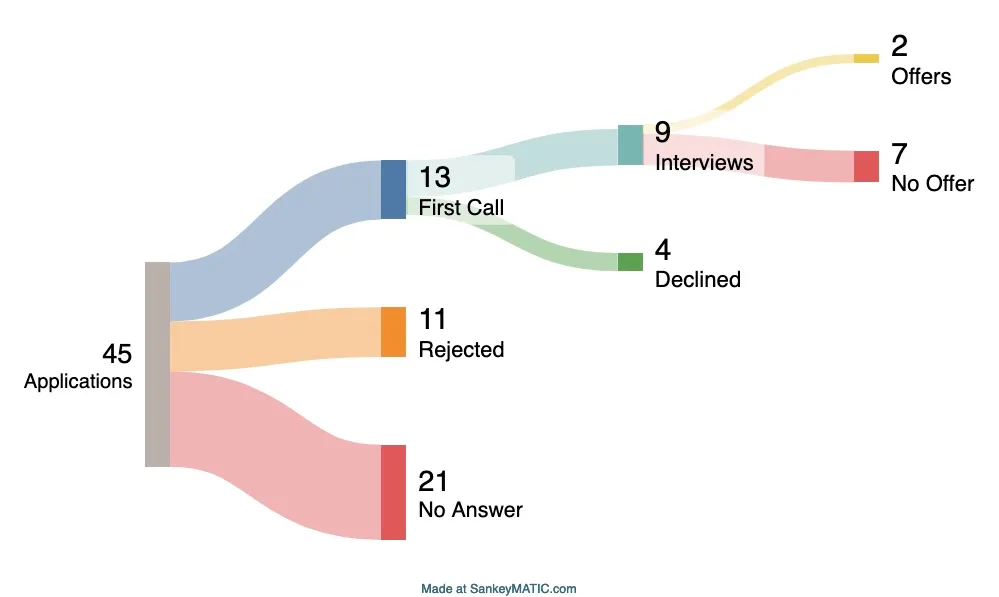
Location Boston, MA
Interests Programming, Photography, Cooking, Game Development, Reading, Guitar, Running, Travel, Never having enough time...
Working On fusion energy at CFS
This Site Made with Astro, Cloudinary , and many many hours of writing, styling, editing, breaking things , fixing things, and hoping it all works out.
Education B.S. Computer Science, New Mexico Tech
Contact site at dillonshook dot com
Random Read another random indie blog on the interweb
Subscribe Get the inside scoop and $10 off any print!
Laid Off for the First Time In My Career, and Twice In One Year
So, I got laid off again… This time it was the week before Christmas, last time it was a week into paternity leave. Both great timing, I know. Last time I didn’t feel like writing about it since it was a swirl of emotions with a new baby in the house and the first time I had been laid off in my career, 13 years in at that point. But this time I’m ready to get it out in a post that’s cathartic for me to write and something you might relate to. If you don’t relate now, I hope it stays that way. Hopefully this post will give you a bit of perspective if you ever do unexpectedly lose your job.
The Indigo Story
For both my stories you’re not going to find any shit-talking here for a number of reasons. First, that’s not the kind of person I am. Second, I feel fairly treated given both companies’ circumstances. And third, I want to keep good relationships with the people both that were laid off at the same time and the people still at both companies. Keeping good connections with your coworkers and not burning bridges is one of the most important things I think you can do in your career.
So with that out of the way, let’s talk about the Indigo story a bit.
One week into paternity leave delirious with sleep deprivation and all the emotions of now caring and loving for such a tiny helpless little baby I remember getting a text from a coworker saying I should probably check my email. A bunch of thoughts and feels rushed in seemingly all at once. What’s going on? Am I getting laid off? I knew there was a chance since the company had multiple rounds of layoffs before but it wasn’t really happening to me on leave right? What was going to happen to our health insurance? Did I do something wrong? How many more people were getting laid off? It felt like ages till the HR call was scheduled and I found out some of the details.
A wave of relief took over after hearing I would get paid out for my paternity leave with severance on top so I could take a deep breath, relax, and enjoy being with my wife and daughter for her first few weeks on the planet we call Earth.
After a week or two when it felt like we were starting to form something resembling a routine it was time to crack back open the resume. This always feels daunting after being at a company for awhile. How do you succinctly summarize and highlight all you’ve done there? Luckily I had some notes from my own self review one year to help but I also made a mental note to myself to start writing down accomplishments as they happen to make this easier next time.
Once I was happy with the updates I got right into the most difficult job search process I’d experienced since trying to find my first software engineering job out of college. I was being selective and only applying for places I’d realistically want to work for and also screening out companies that didn’t seem to have a viable business model which narrowed the field by more than half.
Ultimately it’s a pipeline numbers game though so I kept applying, kept interviewing, and kept persisting until I found a match. My funnel ended up looking like this

It’s easy to get disheartened by the process when you’re in the middle of it and you get through so many interviews with a company you really want to work for only to be told a lame reason why you’re not getting an offer at the end. I really wish companies would start giving honest feedback even if it’s hard for the candidates to hear at first. It would be a much better way for candidates to improve themselves and we’re all adults here and can take the feedback.
The Pryon Story
The Pryon story is much shorter just like my employment was. I don’t feel like going into any of the details since they don’t feel that important now. It was an 85% surprise to me that it happened at all, and 100% surprise for how deep they cut without many signs the company was struggling. I can only speculate what the reasons were, but someone screwed up to hire dozens of people just to lay them off 6 months later. The shock and whirlwind of thoughts and feelings came and went much quicker this time around. Going through the process once before builds your resilience and you take it less personally.
How to Tell a Layoff is Coming
Based on my N=2 experience and the posts I’ve read here are some warning signs to look out for:
- The product org is struggling to set a vision
- Many distractions and lack of focus
- Low products usage
- Perks being cut, cancelled onsite meetings, signs of financial troubles
And last but certainly most telling:
- There’s a “company update” meeting unexpectedly scheduled four hours from now
What to Do if You’ve Been Laid Off
First, take a deep breath, this is going to be stressful. But it’s also a new opportunity to find an even better job, meet new amazing people, and expand your skill set.
Update and Improve your Resume
Depending on how long you’ve been at your last job you might have a lot or a little to add. Regardless though, you should try and improve the design a little bit each time you update it. Your resume is highly personal and should reflect some of your personality while still looking as professional as possible, so I use any templates or resume builders myself. Just 100% artisanal HTML and CSS for me baby. I want it to stand out from the hundreds and hundreds of other resumes out there in the application pool.
Try some new font pairings. Add a touch of iconography. Improve the spacing. Refine, refine, refine.
File for Unemployement Benefits
Don’t feel any stigma for filing for unemployment after you’ve been laid off. Your pay your taxes into the system and deserve to get money back when you’re unemployed. I didn’t file after the first time since I had a long period of severance and didn’t want to deal with the overhead but I’ve already filed this time.
Start Searching for Jobs
The best places I’ve found to look in the past are:
- Stack Overflow jobs (RIP)
- Monthly Hacker News Who’s Hiring Thread
- Networking and local meetups. This is much more hit and miss for finding a job quickly but it’s playing the long game to grow your network in your local community that is well worth the effort.
- LinkedIn. I don’t apply to jobs directly since they’re flooded with applicants. Instead I find places I want to work at that have jobs posted on their company website then reach out to employees in the department and try to make a connection and get an introduction.
- Recruiters. Don’t discount or blow them off. They have a vested interest in getting you hired and 3 of my jobs have been found through them.
Some other site’s I’ve used with mixed results are Hiring Cafe, Otta Welcome To The Jungle (weird rebrand name), Post Hog’s Cool Tech Jobs, and Unlisted Jobs.
As I mentioned before, when you’re looking for jobs and you want to avoid a layoff in the future it pays to understand the business model and how the company you’re applying to makes money. Ask where the company is in its profitability journey. How many customers do they have? Are they B2B (selling to other business) or B2C (selling directly to consumers)? How long is the sales or conversion process for each customer? How much money does each customer spend? How many rounds of funding has the company raised and for how much? Is the company visibly blowing a lot of money? One place I interviewed for flew its employees across the Atlantic for on sites once a quarter. You’re not going to get an exact answer to all these questions but you should be getting a sense in your head of how financially stable a company is while you’re interviewing.
Keep Track of the Jobs you Applied For
You’re likely going to have to do this for the unemployment benefits anyways but it also serves the purpose of making sure you don’t apply to a place twice (more likely than you think with the number of applications you’re going to have to send out), and tracking your progress through all the stages. You might be able to find patterns with what worked and what didn’t by tracking as well but for me it’s felt like there’s too many variables at play with each application to find much commonality.
Work on a Project
While you’re unemployed I’ve found it very helpful to have a side project to work on at the same time. It helps keep me sane through the process of looking through hundreds of job posts. Doing that for 8 hours a day will just make your eyes bleed and brain rot. It could be an idea you’ve had in the back of your head for awhile and never had the time to work on till now or it could be an open source project you’ve used and want to improve. Working on an actual project will keep your skills fresh, break up the days, and you’ll have something to show and talk about during the interview process. With any luck the project might even lead to finding job opportunities directly.
Keep At It
The software engineering job market today is very different than it has been prior to (and during Covid). If you haven’t searched for a job since then it will surprise you how much more of an employers market it is now. Ultimately though, if you’ve got the skills you will find a job if you play the game long enough and stay positive through the process. You got this.
The Takeaway
Layoffs are increasingly becoming part of the normal tech industry experience. More than 150,000 layoffs were reported in 2024 and a whopping 264,000 in 2023. And those are just the reported ones. During the process the first time around I distinctly remember feeling some guilt/shame as if I hadn’t done enough to prove my worth and avoid the axe for the fourth (or more depending on how you count) time. But ultimately it’s not my fault or decision it happened, just like it’s very likely it’s not your fault if it happens to you. I’m not the one deciding to spend over 400 million dollars on spaghetti to see what sticks to the wall. Not yet at least :)
An important part of the process is also learning to retake your pen. This is a concept from the book Crucial Conversations I read recently that’s all about learning to define your own self worth and your story in your own words. Don’t let other people tell your story for you or define success for you. In our society where we place such emphasis on your profession, a job loss can mean a shaken self identity. It’s up to you to tell your (truthful of course) side of the story and define yourself separately from any single employer.
I think it’ll still be a while longer before we can start to say the dust has settled in the tech industry from the end of ZIRP and the disruption AI tools are bringing. So keep your chin up and keep learning!
P.S. See lots more comments posted over on Hacker News
Want the inside scoop?
Sign up and be the first to see new posts
No spam, just the inside scoop and $10 off any photo print!
